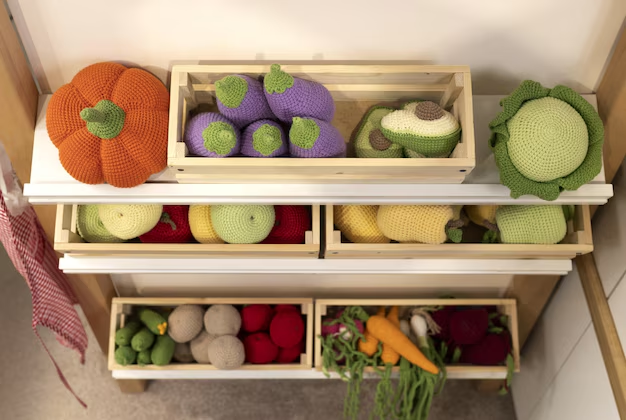Should You Keep Apples in the Refrigerator? Everything You Need to Know 🍏
Picture this: you just returned from the grocery store with a bag full of fresh apples, each bursting with color and an enticing promise of sweetness. As you unload your groceries, a question lingers: should you store these apples in the refrigerator? It's a common query with surprisingly nuanced answers. Let’s delve into the factors that influence apple storage, explore the science behind it, and find the optimal way to keep your apples fresh and delicious.
Understanding Apple Storage
Room Temperature vs. Refrigeration
Room Temperature: Leaving apples at room temperature allows them to ripen fully, which can enhance their flavor and aroma. This method is best for apples you plan to consume within a week or so. However, be aware that leaving apples out can hasten their maturation and spoilage.
Refrigeration: Keeping apples in the fridge can extend their shelf life significantly as the cold temperature slows down the aging process. This is ideal for those who buy in bulk or consume apples less frequently. Yet, refrigeration might alter the apple's texture over time, making it less crisp.
Ethylene Gas: The Ripening Culprit
Apples naturally emit ethylene gas, a compound that accelerates ripening in fruits. This can be beneficial for other fruits you wish to ripen quickly, but it can also expedite spoilage. Refrigerating apples minimizes ethylene's effect, thus prolonging freshness.
The Science of Apple Preservation
Why Do Apples Last Longer in the Fridge?
Cold temperatures slow down the cellular processes in apples, delaying the breakdown of acids and sugars that lead to spoilage. By refrigerating apples, you're essentially slowing their life cycle, preserving taste and nutritional value for a longer period.
Does Refrigeration Affect Nutritional Value?
While refrigeration is effective in prolonging the freshness of apples, it’s important to note that nutritional content remains largely unchanged whether you store them at room temperature or in the fridge. Vitamins, fibers, and antioxidants remain intact, ensuring you reap all the health benefits apples offer, regardless of your storage choice.
Practical Tips for Storing Apples
Optimal Refrigerator Conditions
To maximize the refrigeration benefits:
- Temperature: Set your fridge at 32-40°F (0-4°C). This range is ideal for maintaining apple freshness.
- Humidity: Use a crisper drawer with a high humidity setting to prevent moisture loss.
- Separation: Store apples away from vegetables sensitive to ethylene gas, like leafy greens or root vegetables.
Selecting the Right Container
- Perforated Plastic Bags: Allows apples to breathe while maintaining necessary humidity levels.
- Specialized Produce Keepers: These containers optimize airflow and humidity, further extending shelf life.
Room Temperature Storage
If refrigerating isn't feasible:
- Display in a Fruit Bowl: Preferably keep them away from direct sunlight and in a cool area.
- Rotation is Key: Consume those on the bottom first to ensure none go to waste as they soften quicker under the pile.
Addressing Common Concerns
Changes in Texture and Flavor
Refrigerating apples can alter their crispness subtly over time. If you prefer your apples crunchy, consider consuming them sooner rather than later or using room temperature storage for short-term needs.
Is All Refrigeration Equal?
Not all fridges are the same. Environmental conditions such as fluctuating temperatures or humidity levels might alter results. Regular checks and adjustments are crucial to ensure optimal apple preservation.
Related Topics in Apple Storage
Different Apple Varieties
Not all apples are created equal. Some varieties, like Granny Smith and Fuji, are known for their longevity and sustain crispness longer than softer varieties like McIntosh. Knowing which apples last longer helps make informed storage decisions.
Seasonal vs. Off-Season Purchases
Apples bought in season are typically fresher and last longer than off-season imports. However, off-season varieties can often survive extended periods in cold storage due to advanced preservation methods used during transport.
🍏 Quick Summary: Apple Storage Tips 🍏
- Refrigeration: Best for long-term storage, slows down ripening and prolongs shelf life.
- Room Temperature: Ideal for short-term enjoyment, enhances flavor but quickens spoilage.
- Containers: Use perforated bags or produce keepers to maintain freshness.
- Ethylene Gas: Keep apples away from vegetables to prevent rapid aging.
- Optimal Conditions: Aim for 32-40°F with high humidity settings.
Seasonal Guidance on Apple Storage
Understanding when apples are in season can further guide your storage choices:
- Fall Harvest Apples: Often fresher and can be stored for months if refrigerated.
- Off-Season Purchases: Benefit more from refrigeration due to handling in cold storage before sale.
Organic vs. Non-Organic Options
Do Organic Apples Store Differently?
Organic apples might spoil faster than their non-organic counterparts due to the absence of synthetic preservatives. Washing before storage, as opposed to after, can remove bacteria and dirt, extending their shelf life somewhat.
Handling Recommendations
- Wash Before Storage: For organic apples, washing and thorough drying before refrigerating can inhibit mold growth.
- Leave the Bag Open: A slightly open bag allows excess moisture to escape.
Bringing It All Together
Making an informed decision about whether to refrigerate apples hinges on a few key considerations: consumption timeline, preferred apple varieties, and current storage capacity. Personal preference for crispness versus flavor complexity also plays a role in determining storage choices. By understanding the underlying science of apple preservation and considering the practical tips outlined above, you can ensure your apples remain fresh and delicious whether you're snacking on them immediately or savoring them over time.
Ultimately, whether in the fridge or on the counter, the goal is to enjoy your apples at their best. Happy snacking! 🍎

